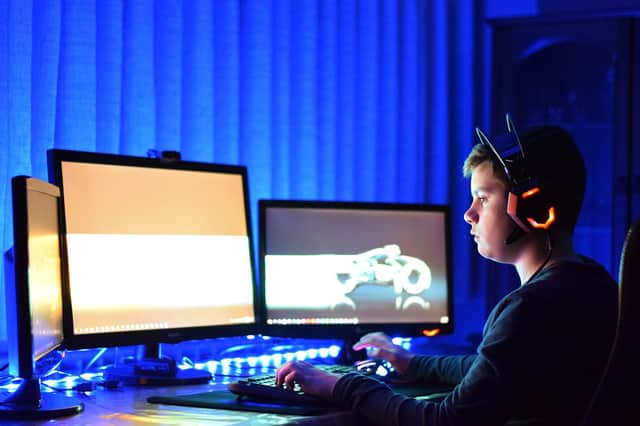Screen use is putting children's sight at risk, newest research reveals


A campaign to save children’s sight has been launched as parents are told they ‘must act now’ to tackle a childhood myopia crisis.
Time spent in front of screens is contributing to a rise in the condition of myopia in children - or short-sightedness, that is now twice as common as it was in the 1960s, and can cause serious eye problems, even blindness, later in life.
Advertisement
Hide AdAdvertisement
Hide AdRecent research shows a definite link between screen-time and the risk and progression of myopia, as optometrists see a sharp incline in numbers of children who struggle to see the board at school.
To combat the growing crisis, a new campaign and educational resource has been launched in the UK.
MyopiaFocus.org is a new portal aimed at parents, to raise awareness of the myopia epidemic, connect them with local myopia specialists and help them to understand their child’s condition.
Optometrist Jason Higginbotham worked alongside leading myopia specialists, to launch the resource.
Advertisement
Hide AdAdvertisement
Hide AdHe said: “I am concerned at the lack of understanding and support for what is going on with children’s eyes right now.
“Increased use of screens, close work, and lack of outdoor time have been proven to have had a significant impact on myopia becoming an epidemic. The genetic element of myopia will also compound the issues caused by modern lifestyles.”
He continued: “We need to highlight the urgent need for proactive myopia management. A personalised eye care plan can significantly decrease the progression of myopia in children by 50 per cent or more.
“Unless parents act and have their child’s eyes tested, myopia may go undetected”.
Advertisement
Hide AdAdvertisement
Hide AdTips on how to reduce your screen time:
Myopia is now considered by the World Council of Optometry as a ‘serious eye condition that all children should be screened for’.
The World Health Organization (WHO) predicts that up to half of all people will have myopia by 2050.
In 2015, the WCO declared that the ‘standard of care for myopia must include early detection in children, allowing myopia management with evidence-based treatments to prevent catastrophic healthcare effect.’ Progress with these has not been rapid enough.
Prominent myopia management specialists are backing the portal, including Optometrist of the Year 2020, Dr Keyur Patel, who said: “We now have many tools at our disposal to try to reduce the potential levels of myopia, and it is up to eyecare professionals to educate our patients.
Advertisement
Hide AdAdvertisement
Hide Ad“Myopia Focus provides a valuable resource and I hope it can help kick start these conversations with parents.”


Leading myopia management pioneer, Bhavin Shah, said: “Many parents have been able to help slow the deterioration in their child’s sight but there are significantly more who aren’t aware about the latest technology that can help their child”.
Myopia Focus has launched a change.org campaign, that is seeking to get the NHS to recognise myopia as an ocular disease and fund myopia management.
The onset of myopia usually occurs between six and 13 years of age.